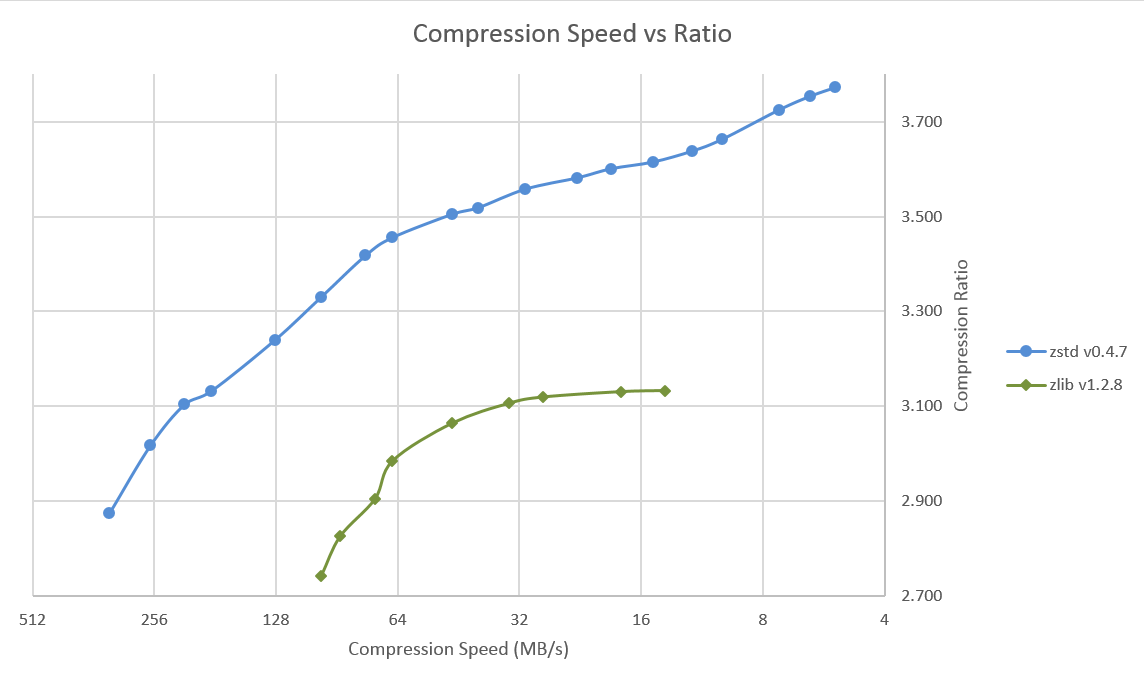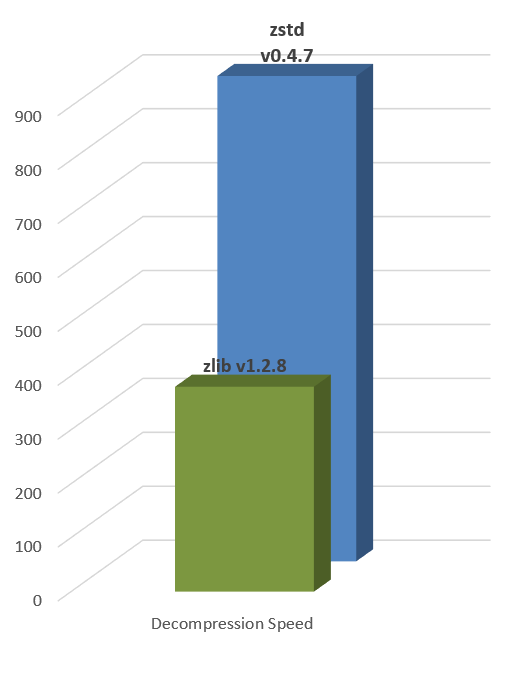| contrib/cmake | ||
| dictBuilder | ||
| images | ||
| lib | ||
| programs | ||
| visual/2013 | ||
| .gitattributes | ||
| .gitignore | ||
| .travis.yml | ||
| Makefile | ||
| NEWS | ||
| README.md | ||
Zstd, short for Zstandard, is a fast lossless compression algorithm, targeting real-time compression scenarios at zlib-level compression ratio.
It is provided as a BSD-license package, hosted on Github.
| Branch | Status |
|---|---|
| master | |
| dev |
As a reference, several fast compression algorithms were tested and compared to zlib on a Core i7-3930K CPU @ 4.5GHz, using lzbench, an open-source in-memory benchmark by @inikep compiled with gcc 5.2.1, on the Silesia compression corpus.
| Name | Ratio | C.speed | D.speed |
|---|---|---|---|
| MB/s | MB/s | ||
| zstd 0.4.7 -1 | 2.875 | 330 | 890 |
| zlib 1.2.8 -1 | 2.730 | 95 | 360 |
| brotli -0 | 2.708 | 220 | 430 |
| QuickLZ 1.5 | 2.237 | 510 | 605 |
| LZO 2.09 | 2.106 | 610 | 870 |
| LZ4 r131 | 2.101 | 620 | 3100 |
| Snappy 1.1.3 | 2.091 | 480 | 1600 |
| LZF 3.6 | 2.077 | 375 | 790 |
Zstd can also offer stronger compression ratio at the cost of compression speed. Speed vs Compression trade-off is configurable by small increment. Decompression speed is preserved and remain roughly the same at all settings, a property shared by most LZ compression algorithms, such as zlib.
The following test is run on a Core i7-3930K CPU @ 4.5GHz, using lzbench, an open-source in-memory benchmark by @inikep compiled with gcc 5.2.1, on the Silesia compression corpus.
| Compression Speed vs Ratio | Decompression Speed |
|---|---|
 |
 |
The case for Small Data compression
The above chart is applicable to large files or large streams scenarios (200 MB in this case). Small data (< 64 KB) come with different perspectives. The smaller the amount of data to compress, the more difficult it is to achieve any significant compression. On reaching the 1 KB region, it becomes almost impossible to compress anything. This problem is common to all compression algorithms, and throwing CPU power at it achieves no significant gains.
The reason is, compression algorithms learn from past data how to compress future data. But at the beginning of a new file, there is no "past" to build upon.
Starting with 0.5, Zstd now offers a Dictionary Builder tool. It can be used to train the algorithm to fit a selected type of data, by providing it with some samples. The result is a file (or a byte buffer) called "dictionary", which can be loaded before compression and decompression. By using this dictionary, the compression ratio achievable on small data improves dramatically :
| Collection Name | Direct compression | Dictionary Compression | Gains | Average unit | Range |
|---|---|---|---|---|---|
| Small JSON records | x1.331 - x1.366 | x5.860 - x6.830 | ~ x4.7 | 300 | 200 - 400 |
| Mercurial events | x2.322 - x2.538 | x3.377 - x4.462 | ~ x1.5 | 1.5 KB | 20 - 200 KB |
| Large JSON docs | x3.813 - x4.043 | x8.935 - x13.366 | ~ x2.8 | 6 KB | 800 - 20 KB |
It has to be noted that these compression gains are achieved without any speed loss, and even some faster decompression processing.
Dictionary work if there is some correlation in a family of small data (there is no universal dictionary). Hence, deploying one dictionary per type of data will provide the greater benefits.
Large documents will benefit proportionally less, since dictionary gains are mostly effective in the first few KB. Then there is enough history to build upon, and the compression algorithm can rely on it to compress the rest of the file.
Status
Zstd has not yet reached "stable format" status. It doesn't guarantee yet that its current compression format will remain stable in future versions. During this period, it can still change to adapt new optimizations still being investigated. "Stable Format" is projected H1 2016, and will be tagged v1.0.
That being said, the library is now fairly robust, able to withstand hazards situations, including invalid inputs. It also features legacy support, so that documents compressed with current and previous version of zstd can still be decoded in the future. Library reliability has been tested using Fuzz Testing, with both internal tools and external ones. Therefore, Zstandard is considered safe for testings, even within production environments.
Branch Policy
The "dev" branch is the one where all contributions will be merged before reaching "master". If you plan to propose a patch, please commit into the "dev" branch or its own feature branch. Direct commit to "master" are not permitted.
Trivia
Zstd entropy stage is provided by Huff0 and FSE, from Finite State Entropy library.
Its memory requirement can be configured to fit into low-memory hardware configurations, or servers handling multiple connections/contexts in parallel.